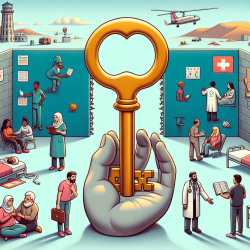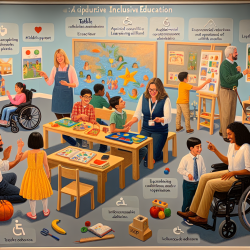Understanding Communication Barriers in Health Care: Insights for Practitioners
In the realm of speech-language pathology, effective communication is paramount, especially when dealing with diverse populations. The recent study titled "Asylum Seekers and Swiss Nationals with Low-Acuity Complaints: Disparities in the Perceived Level of Urgency, Health Literacy and Ability to Communicate—A Cross-Sectional Survey at a Tertiary Emergency Department" sheds light on the challenges faced by asylum seekers (AS) and Swiss nationals (SN) in emergency departments (EDs). This research provides valuable insights for practitioners aiming to improve communication and health outcomes for children and other vulnerable populations.
Key Findings of the Study
The study highlights several critical disparities between AS and SN patients:
- AS patients often lack knowledge of the Swiss health care system (HCS), with 30.2% reporting no knowledge at all.
- There is a significant need for interpreters, as 53.8% of AS patients required one during ED consultations.
- AS patients frequently perceive their medical needs as more urgent than assessed by physicians, with 34.9% perceiving a need for treatment within one hour.
Implications for Practitioners
These findings underscore the importance of addressing communication barriers and enhancing health literacy among AS populations. Practitioners can take several steps to improve outcomes:
- Enhance Health Literacy: Develop educational programs tailored to AS patients to improve their understanding of the HCS and empower them to make informed health decisions.
- Utilize Professional Interpreters: Ensure access to professional interpreters to facilitate accurate communication and avoid reliance on untrained family members.
- Train Staff in Cultural Competency: Provide training for medical staff to better understand the cultural and linguistic needs of AS patients, fostering a more inclusive health care environment.
Encouraging Further Research
While this study provides valuable insights, it also highlights the need for further research to explore the underlying causes of these disparities. Practitioners are encouraged to engage in research initiatives that focus on:
- Identifying effective strategies for improving health literacy among AS populations.
- Exploring the impact of professional interpreter services on patient outcomes.
- Assessing the effectiveness of cultural competency training programs in health care settings.
By actively participating in research and implementing data-driven strategies, practitioners can significantly improve communication and health outcomes for AS patients and other vulnerable groups.
To read the original research paper, please follow this link: Asylum Seekers and Swiss Nationals with Low-Acuity Complaints: Disparities in the Perceived level of Urgency, Health Literacy and Ability to Communicate—A Cross-Sectional Survey at a Tertiary Emergency Department.










